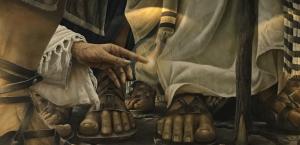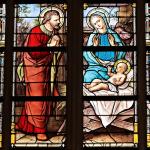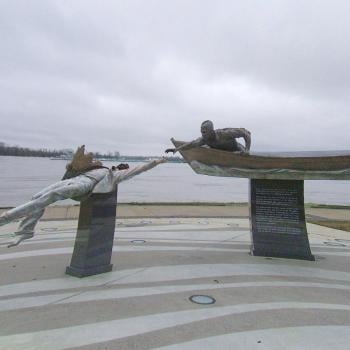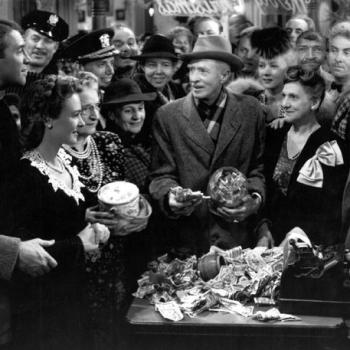
Growing up in a Christian denomination in which the scriptural stories of women were never taught or preached, I had no understanding of the presence or importance of women in the sweep of Biblical history – save, of course, Mary, Mother of Jesus, who was celebrated and revered for being virginal, pure and submissive to the will of God, a model for all women.
I was a young adult when I first encountered the story of the hemorrhaging woman, as the Gospel lesson was being read. I didn’t recall ever having heard that lesson before. But, that day, I heard the words from scripture: A woman had been hemorrhaging for twelve long years, and no physician had been able to help her. Women of her culture were considered unclean during their monthly cycles, and no doubt, she had been marginalized by everyone in her community because of her persistent unclean state. She had heard that a teacher named Jesus was coming, and her faith in him and the healing that she believed he could perform were great enough for her to venture out into the public, her condition and the potential for public disgrace notwithstanding. She trusted, and dared to draw close enough to Jesus to touch his clothing. The touch was a healing one: She was no longer hemorrhaging.
Had I heard her story a few years earlier, I likely would have cried. I certainly would have related to this suffering woman.
In many ways, I had been her.
I certainly would have related to this suffering woman. In many ways, I had been her.
Having a parent whose life and health were complicated with mental illness had presented more than its share of challenges. As hard as I had tried to convince my mother that I truly needed to see a doctor about what seemed to be abnormally heavy menstrual cycles, she was unbudging. She didn’t trust doctors, and wasn’t about to allow me to see a doctor about so private a matter.
So, I asked my friends, discretely, about what seemed to be “normal,” trying not to give away the secret that I was heavily bleeding for 10 days each month. My friends’ description of “normal” seemed to be anything but what I was experiencing.
A physical examination required for college admission necessitated the first visit I’d had to a doctor’s office in years. Sitting in the doctor’s office on a spring day during my senior year of high school, I whispered words that I hadn’t been able to utter previously, in response to the doctor’s question about whether I had any health concerns.
“I really think something is wrong with me. My periods seem to be too heavy, and too long.”
The doctor listened as I described what was happening: heavy bleeding, severely painful cramps, nausea and vomiting, exhaustion – for nearly two weeks of every month. I had probably missed at least one day of school every month all through high school, because I’d just been too sick to go. It was a good thing that I was a good student; my grades hadn’t suffered in all of the mayhem.
The doctor had more questions, but we could hear my mother yelling from the waiting room. I’d only had a couple of minutes, and my time had run out.
His advice to me was simple: “When you go to college, try to find a clinic where you can get a well-woman exam. They’ll be able to tell you better what’s going on after you have that exam.” He also suggested that I start taking Geritol, to build up my iron. Even without having results from my lab work, he felt certain that there must be some concern about anemia.
For the first time, I was encouraged. I started taking Geritol immediately. After I arrived at my new college in the fall, I visited the infirmary to ask the nurse there where one might have a well-woman exam. The nurse suggested Planned Parenthood as an affordable and accessible place for a student to visit.
Planned Parenthood? My young self knew that my parents could not know that I had visited any place called Planned Parenthood; there would be no way to explain that. The nurse at the infirmary assured me that the visit would remain confidential. I phoned, and made an appointment.
At Planned Parenthood, a patient young physician listened to my story, performed the exam, ran blood work, and went to great lengths to calm my anxious teenaged fears. I left with birth control pills – not at all for sexual activity, but rather to regulate my hormones, normalize my monthly cycle, and give me a shot at a healthy life. What I hadn’t realized prior to that visit was that my fertility health had been at risk. A patient young doctor at Planned Parenthood likely preserved my ability to be able to bear children.
A patient young doctor at Planned Parenthood likely preserved my ability to be able to bear children.
On a day when she musters up great courage, a hemorrhaging woman goes in search of Jesus, hiding herself well in the crowd and planning only to touch his clothing – just in case even Jesus might shun her in her unclean state.
But Jesus doesn’t shun her. Jesus invites her to the forefront so that everyone can see that she is healed, that she is clean, that she can be restored to community. Her community can see her in a new way – no longer as an unclean, untouchable, unheal-able woman. Jesus has called her out of the shadows, out of her shame, and into the line of the community’s sight.
Jesus invites her to the forefront so that everyone can see that she is healed, that she is clean, that she can be restored to community.
When Jesus calls a hemorrhaging woman from her shame and hiding in a crowd, he makes her visible; when he heals her, he makes her healing visible.
Too many of God’s people in our own world live in the shame of sickness, whether of body, mind or spirit. We may be unaware of the ways in which God has brought healing to us. We may fear stepping out of our darkness and shame. We may see ourselves as unworthy of being healed. It takes courage for any of us to step out of the shadows and to believe that God’s great love for us is a love that longs to see us healed.
We too often neglect to talk about the courage that it takes for us to see one another healed and renewed – to see one another in a new light and to welcome one another as we are restored to community. Recognizing that a neighbor has been healed and welcoming that neighbor back into the fold is also an act of courage, compassion and love.
How may we help to encourage one another to step out of the darkness of shame and sickness, into the light, into God’s healing touch?













